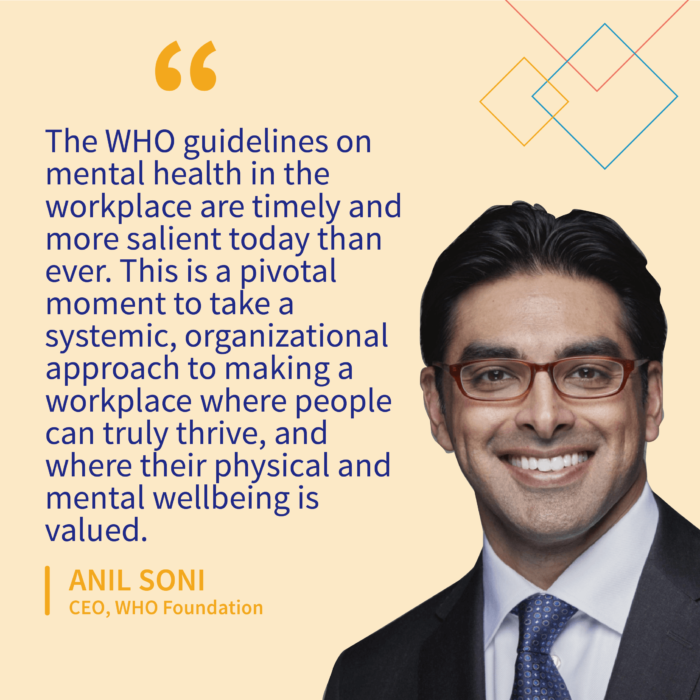Protecting and promoting mental health at work: WHO launches seminal guidelines
As of 2022, almost 60% of the world’s population is economically active. In low- and middle-income countries, 69% of the workforce works in the informal economy, without regulatory health and safety protection. Workers in specific sectors, (including health and emergency workers), as well as low-paid and less-secure jobholders, are at a greater risk of poor mental health. Socioeconomic and demographic factors, such as ethnic background, migrant status, or lower daily wage for those working in gig or care economies might increase the likelihood of experiencing mental health conditions.
Work and mental health are closely intertwined. In governments, workplaces, and communities around the world, mental health is too often misunderstood, under-resourced, and deprioritized. People with mental health conditions are routinely stigmatized, discriminated against, and excluded. As described in WHO’s latest World Mental Health Report: Transforming mental health for all (published in June 2022), an indisputable and urgent transformation is required to ensure better mental health for all, including those in work.
All workers have the right to a safe and healthy environment. While work can be a protective factor for mental health, it can also contribute to potential harm.
Today, the World Health Organization (WHO) has published the WHO guidelines on mental health at work with an accompanying policy brief, co-authored with the International Labor Organization (ILO). The guidelines are a call to action for mental health at work and evidence-based global public health guidance on organizational interventions, manager and worker training, and individual interventions. The guidelines also contain recommendations on returning to work following an absence associated with mental health conditions and gaining competitive employment to people living with mental health conditions. They aim to spur national and workplace-level actions to change policies, and to plan and deliver better mental and occupational health services.
“It’s time to focus on the detrimental effect work can have on our mental health,” said Dr Tedros Adhanom Ghebreyesus, WHO Director-General. “The well-being of the individual is reason enough to act, but poor mental health can also have a debilitating impact on a person’s performance and productivity. These new guidelines can help prevent negative work situations and cultures and offer much-needed mental health protection and support for working people.”
The guidelines and the accompanying policy brief describe the inextricable links between mental health and work, outline the responsibilities of employers and rights of workers, and identify specific actions that stakeholders can take to:
- Prevent exposure to risks to mental health at work.
- Protect and promote mental health and well-being at work.
- Support people with mental health conditions to participate in and thrive at work.
“Work and mental health are closely linked, whether good or bad, they both affect each other. WHO guidelines on mental health at work provide recommendations on the effective interventions to prevent the risks to mental health at work, protect and promote mental health, and support people living with a mental health condition to participate at work. Our ambition with these new WHO guidelines is to provide the imperative for action for improving mental health at work” added Dévora Kestel, Director, Mental Health and Substance Use at WHO.
These WHO guidelines provide a new impetus to centering employee mental health in the world of work by offering clear evidence-based pathways on who needs to do what. It arms governments, employers, and the organizations which represent workers and employers with essential guidance on preventing and mitigating the risks that can lead to poor employee mental health. Widespread uptake of WHO’s guidelines for mental health at work has transformative potential for how people experience workplaces and how those with mental health conditions can be supported to partake in the labor market.

According to Anil Soni, CEO of the WHO Foundation, “The WHO guidelines on mental health at work are timely and more salient today than ever. I know that many companies will welcome such a constructive and clear overview with express recommendations to address employees’ mental wellbeing. Supporting and funding the work of WHO to promote good employee mental health is a priority for the WHO Foundation and I know many employers have a tremendous contribution to make in this area. This is a pivotal moment to take a systemic, organizational approach to making a workplace where people can truly thrive, and where their physical and mental wellbeing is valued. We stand ready to catalyze the collaboration between employers and WHO, which offers evidence-based guidance and expertise.”
At the WHO Foundation, our mission is to support the work of WHO, including fostering the uptake of these pathbreaking guidelines on mental health at work. The guidelines have tremendous potential to improve the mental wellbeing of all workers and support those with mental health conditions to continue to be economically productive.
The WHO Foundation and WHO plan to co-create a Community of Practice (CoP) for mental health at work to bring together employers who are driven to champion employee mental wellbeing, even as the pandemic has wrought a seismic shift in how employees perceive work. This CoP shall look to enroll an inaugural cohort of employers that will benefit from an opportunity to implement the first-ever WHO guidelines on mental health at work. Importantly, it will provide a peer learning platform in implementing these guidelines with technical oversight from the WHO and generate new knowledge and insights for embedding mental well-being in the future of work.
The WHO Foundation continues to harness the power of partnerships to raise funds and nurture collaborations for the mission of WHO.
To get involved and partner with the WHO Foundation, please learn more on our website or contact us at partnerships@who.foundation.

